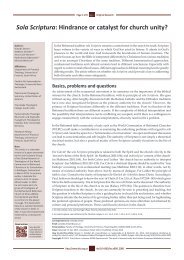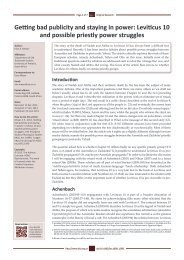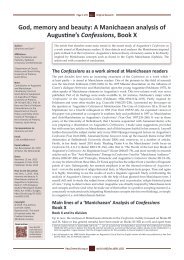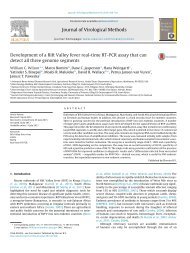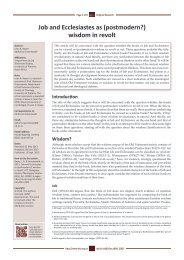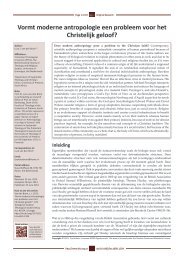View/Open - Repository.up.ac.za - University of Pretoria
View/Open - Repository.up.ac.za - University of Pretoria
View/Open - Repository.up.ac.za - University of Pretoria
Create successful ePaper yourself
Turn your PDF publications into a flip-book with our unique Google optimized e-Paper software.
THE LAW OF PURCHASE AND SALE<br />
1077<br />
entitled to cancellation by virtue <strong>of</strong> a material bre<strong>ac</strong>h or a lex<br />
commissoria will lead to an unfair result, as the consumer is finally<br />
and permanently dispossessed, which absolves the credit provider<br />
from any counter-performance (para [32]). Put differently,<br />
although the consumer is dispossessed <strong>of</strong> the goods, he remains<br />
liable for payment <strong>of</strong> the instalments (para [33]). This appro<strong>ac</strong>h is<br />
in <strong>ac</strong>cordance with the view <strong>of</strong> JM Otto (The National Credit Act<br />
Explained (2006)), and JW Scholtz, JM Otto, E van Zyl, CM van<br />
Heerden and N Campbell (Guide to the National Credit Act<br />
(2008)).<br />
The court concluded that the intention <strong>of</strong> Parliament was to<br />
encro<strong>ac</strong>h <strong>up</strong>on credit providers’ common-law rights only in two<br />
limited ways (para [40]) — by prescribing procedures to be<br />
followed prior to the enforcement <strong>of</strong> a debt (ss 129 and 130), by<br />
prescribing the execution and reali<strong>za</strong>tion process to be followed<br />
after cancellation <strong>of</strong> the credit agreement (s 131 read with<br />
s 127(2)–(9); cf A Boraine & S Renke ‘Some Pr<strong>ac</strong>tical and<br />
Comparative Aspects <strong>of</strong> the Cancellation <strong>of</strong> Instalment Agreements<br />
in Terms <strong>of</strong> the National Credit Act 34 <strong>of</strong> 2005 (Part 1)’<br />
(2007) 40 De Jure 222; ‘Some Pr<strong>ac</strong>tical and Comparative<br />
Aspects <strong>of</strong> the Cancellation <strong>of</strong> Instalment Agreements in Terms <strong>of</strong><br />
the National Credit Act 34 <strong>of</strong> 2005 (Part 2)’ (2008) 41 De Jure 1). It<br />
is certain that the common-law principle requiring cancellation<br />
prior to att<strong>ac</strong>hment and repossession in order to maintain a<br />
consistent and harmonized system <strong>of</strong> debt enforcement remains<br />
untouched by Parliament (para [42]).<br />
For the sake <strong>of</strong> completeness, note that the National Credit Act<br />
provides that the passing <strong>of</strong> ownership in a ‘credit trans<strong>ac</strong>tion’<br />
can either be reserved until the consumer fully complies with the<br />
contr<strong>ac</strong>t, or not. In the latter instance, the credit provider is still<br />
entitled to repossession <strong>up</strong>on the consumer’s default. Apparently<br />
the reason for the possible scenario <strong>of</strong> ownership transfer on<br />
conclusion <strong>of</strong> the ‘credit trans<strong>ac</strong>tion’ is to motivate credit providers<br />
to adhere to the strict provisions <strong>of</strong> the Act (Stéfan Renke &<br />
Marissha Pillay ‘The National Credit Act 34 <strong>of</strong> 2005: the Passing <strong>of</strong><br />
Ownership <strong>of</strong> the Thing Sold in Terms <strong>of</strong> an Instalment Agreement’<br />
(2008) 71 THRHR 641).<br />
Concurrent Jurisdiction<br />
In Absa Bank Ltd v Myburg [2008] JOL 21210 (T), Bertelsmann<br />
J addressed in detail the objects pursued by Parliament in<br />
protecting credit-receiving consumers against exploitation by



